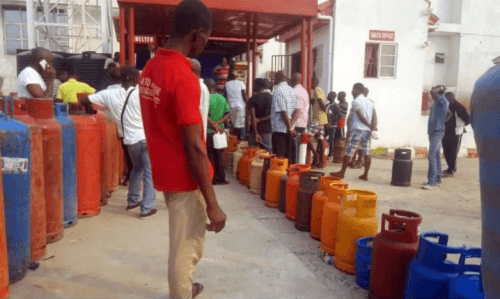The Petroleum Products Pricing Regulatory Agency (PPPRA) has blamed the high price of Liquefied Petroleum Gas (LPG) also known as cooking gas in the market on incessant pirates attack on LPG vessels and the delay in LPG vessel movement.
Speaking on Tuesday in Abuja, at an interactive retreat on understanding the dynamics of downstream sector of the petroleum industry, PPPRA’s General Manager, Gas and Renewable, Olasupo Agbaje, disclosed that the removal of value added tax (VAT) initially brought down the price of LPG, before the recent spike in the price.
Agbaje stated that the LPG market is very sensitive and reacts sharply to any disruption in supply, hence the current high price.
He said, “The removal of VAT on locally-produced LPG had an immediate impact on the price of the commodity in the market. There are many factors that account for pricing. When VAT was removed, within one month, we had about 20 percent drop in the price of LPG.
“If you now check, we had some other incidents. There were pirates’ attacks on some LPG vessels. There are combinations of factors. It is a deregulated market; so nobody is tying down any price. You find that it had an immediate impact and then other factors now came in which affected the price and it now went up again.
“The LPG market is very sensitive. Once there is any disruption in vessel movement, or it is stuck in Lagos, you find that people immediately look and take position and them begin to adjust their prices. We have had a series of pirates’ attacks on LPG vessels. It is an issue that needs to be addressed.”
Agbaje said that the PPPRA had a strong partnership with the Nigerian Maritime Administration and Safety Agency (NIMASA), noting, however, that the agencies would continue to work towards addressing the challenges on the waterways, especially as it affects petroleum products supply.
He said, “We have a strong relationship with NIMASA, but piracy goes beyond relationship; it is a criminal thing. You have them operating on their own will. Once there is any disruption, NIMASA would do what it had to do.
“We will continue to collaborate with NIMASA, but this at times has such impacts on the market that is beyond their control. But we would continue to do our best to ensure that we minimize some of these disruptions.”
He further stated that the Federal Government was working on a cylinder injection programme, and was in consultation with stakeholders on the strategy and modality for the programme.
Furthermore, General Manager, Operations, of the PPPRA, Soji Soloye, disclosed that the government was currently working on a framework to determine the actual volume of fuel consumed in the country.
He also stated that Nigeria currently relies on Premium Motor Spirit, PMS, solely imported into the country by the Nigerian National Petroleum Corporation, NNPC, as none of the country’s refineries are presently working.
He explained that the redundancy of the refineries was the major reason why the actual price of PMS sourced from local refineries could not be determined, noting that when the refineries come on stream, the PPPRA would publish the template for the price of locally produced PMS.

